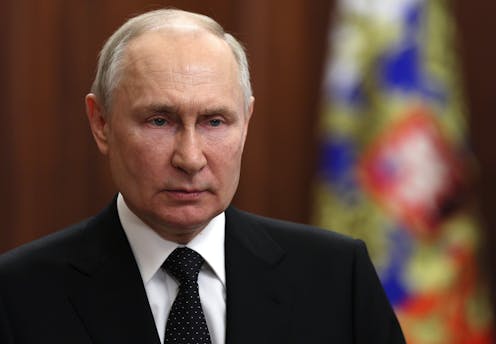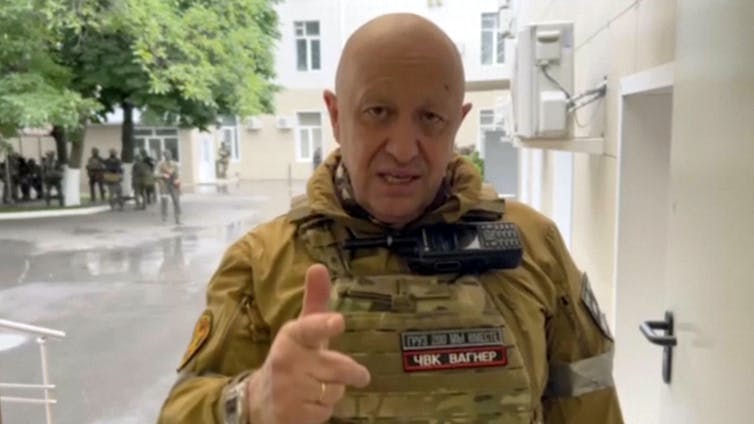Source: The Conversation (Au and NZ) – By Matthew Sussex, Fellow, Strategic and Defence Studies Centre, Australian National University

Gavriil Grigorov/Pool Sputnik Kremlin/AP
It is increasingly clear that a rattled Vladimir Putin’s political end is approaching. All that really matters now is whether it comes sooner or later.
Having appeared on national television to warn of a coup attempt by traitors – and an impending civil war – Putin abruptly reversed his position only a couple of hours later. The Kremlin announced that Yevgeny Prigozhin, the chief protagonist, would go into exile in Belarus and all charges against him had been dropped.
It’s little wonder that Prigozhin, the one-time hot dog vendor who rose through the ranks of Putin’s patronage to head up the infamous Wagner Group, was at the centre of the political maelstrom.
Chafing for weeks at the requirement for Wagner fighters to integrate into the Russian armed forces, Prigozhin became enraged when a Wagner base was attacked by Russia’s military.
His response was nothing short of extraordinary: to drive a convoy into Russia, swearing to confront Defence Minister Sergei Shoigu and Russia’s chief of the general staff, Valery Gerasimov.
After seizing the Southern Military District headquarters at Rostov-on-Don, Prigozhin announced his intention to continue on to Moscow. Once the convoy reached Voronezh, having covered half the distance to the capital largely unmolested, Putin took to the airwaves to vow that anyone who stabbed Russia in the back would be liquidated.
Amazingly, the Wagner Telegram channel responded by saying Putin was mistaken and there would be a new Russian president soon. Wagner’s convoy rolled north until it was only a couple of hours’ drive from the Kremlin itself.
And then everything suddenly stopped. The Kremlin’s spokesman, Dmitry Peskov, announced a compromise had been brokered by the Belarusian President Alexander Lukashenko. Prigozhin would receive safe passage to Minsk, where he would apparently retain control over Wagner’s extensive operations in Africa. Wagner fighters would not be charged with treason and they would be integrated into the Russian military. As for Shoigu and Gerasimov, nobody seemed to know.

Prigozhin Press Service/AP
Read more:
What the Wagner Group revolt in Russia could mean for the war in Ukraine
Questions abound
Even by Russian standards, this outcome was completely bizarre. And while there is doubtless plenty that did not make it into the official announcement, the upshot can only be that Putin has been badly damaged by the melodrama.
Stopping coup attempts – and this was more a mutiny or an insurrection than a coup – can strengthen authoritarian leaders if they are put down quickly and their leaders publicly and harshly dealt with.
But this hasn’t happened. For one thing, it was Putin who backed down, not Prigozhin. For another – even more damaging – Putin seemed distant from the whole process. It was a leader of a foreign country who intervened and solved the problems, rather than anyone in the Russian leadership.
Other questions abound. How did Prigozhin so easily manage to take over the entire Southern Military District headquarters after announcing he was coming and without anyone putting up a fight?
How was his convoy allowed to get so close to Moscow so quickly, waved through checkpoints? Why did Russia’s puzzlingly absent Air Force not intervene, beyond a few helicopters?
And how did Russia’s intelligence services apparently fail to spot Prigozhin’s move, which he had been openly telegraphing for some time? US intelligence had already picked up Prigozhin’s plan by mid-June.
How much has Putin been damaged?
This must be profoundly disquieting for Putin. It strongly suggests that elements of virtually every one of Russia’s security services was likely complicit in Prigozhin’s move – or at the very least apathetic to it.
Even the most benign interpretation – rank systematic incompetence – indicates Russia lacks the ability to deal with serious insider threats against its capital.
It gets worse for Putin. Prigozhin has set a precedent by openly criticising the president, moving against him and forcing him to blink. That will not go unnoticed by Russia’s elites, whom Putin has bound closely to him through alternating cycles of fear and reward. Once an autocrat is unable to deliver on threats of punishments for malfeasance, the risk in taking action diminishes markedly.
Indeed, it was only after Putin publicly condemned Prigozhin that Russia’s loyal nationalists began to come out with their own public criticisms.
Putin’s messaging will now need to perform new feats of rhetorical gymnastics. It is already hard enough to spin his climb-down from “looming civil war” to “everything is fine”. It will be even harder to explain why Prigozhin – who had been lauded as a hero close to Putin – could claim with impunity that Russia’s invasion of Ukraine was based on an untruthful pretext.
What could happen next?
If things are bad for Putin, they are far rosier for Ukraine. In the short term, there is unlikely to be too much difference in the war. Wagner’s forces had already been pulled off the front lines and Ukrainian forces have been confronting a mix of Russian soldiers and mobilised troops for some time.
But with every quashed insurrection comes a search for the guilty – and the inevitability of purges. That’s likely to be a lengthy and comprehensive process involving the Russian military and its intelligence agencies.
Read more:
Putin under pressure: the military melodrama between the Wagner group and Russia’s armed forces
It is well known Prigozhin enjoyed significant support from middle-ranking Russian officers, and these individuals are likely to be the target of the regime’s ire. Paradoxically, they are often the more competent and battle-seasoned soldiers, as well. Morale, already low, will be even more badly damaged.
Ultimately, sooner or later, Russia’s security agencies will also come to the realisation they don’t need to submit to purges anymore and that the main culprit for Russia’s failures, Putin, has been enfeebled by his own actions.
And that’s perhaps the gravest concern for Putin to come out of all of this. Having for years encouraged the Kremlin’s powerful elites to compete for his favour, he’s now given them a powerful reason to unite against him.
![]()
Matthew Sussex has received funding from the Australian Research Council, the Fulbright Foundation, the Carnegie Foundation, the Lowy Institute and various Australian government departments and agencies.
– ref. Wagner’s rebellion may have been thwarted, but Putin has never looked weaker and more vulnerable – https://theconversation.com/wagners-rebellion-may-have-been-thwarted-but-putin-has-never-looked-weaker-and-more-vulnerable-208436




